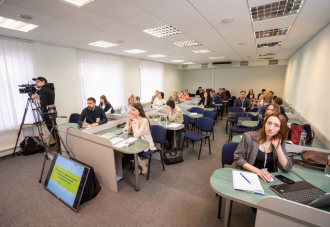As part of its participation in the Working Subgroup on Risk Assessment of the Use of the NPO Sector for Money Laundering and Terrorist Financing (hereinafter – ML/TF), the work of which was announced earlier, CEDEM experts conducted a study of the specific features of civil society organizations (hereinafter – CSOs) that engage volunteers.
According to the Typology Study entitled “Risks and Threats of Money Laundering, Terrorist Financing under the Conditions of Armed Aggression of the Russian Federation – 2024”, which CEDEM received from the State Financial Monitoring Service of Ukraine (SFMSU) in response to a formal request submitted in accordance with the procedure established by law, the SFMSU has determined that the specific features of NPO activities and volunteer engagement make them attractive to terrorist organizations and vulnerable to criminal misuse.
One of the typical cases described in the study concerns fraudulent schemes where perpetrators solicit funds under the guise of volunteers of a charitable organization. Furthermore, the study identifies the illicit use of NPOs and volunteer activities as one of the most pressing threats to financial and national security in the context of the large-scale armed aggression of the Russian Federation against Ukraine.
In view of the above, and given the fact that during the Independent Risk Assessment of the Non-Profit Sector in Ukraine CEDEM experts did not separately analyze NPOs involving volunteers in their activities, we consider additional research in this area to be of high relevance.
It is assumed that the results of the survey of civic associations and charitable organizations that engage volunteers will provide government bodies and civil society experts with the opportunity to adequately assess the vulnerabilities of such organizations and the level of risk inherent in their activities.
In the course of the study, public associations (public unions and public organizations) and charitable organizations registered and operating in the government-controlled territory of Ukraine that engage volunteers in their activities were surveyed. In total, more than 80 organizations, including large network-based ones, were involved in the study.
The research was conducted with the support of the National Social Service of Ukraine (NSSU) within the framework of the Memorandum of Partnership and Cooperation between CEDEM and NSSU. NSSU distributed the survey questionnaire to all organizations engaging volunteers and listed in the Register of Institutions that Involve Volunteers in Their Activities to Conduct Volunteer Work in Ukraine.
Main results of the survey:
- 89% of organizations do not involve volunteers in direct collecting of funds. Those that do comply with Ukrainian legislation, sign agreements with volunteers, and issue powers of attorney. Such volunteers are vetted.
- 54% of organizations sign agreements with volunteers involved in their activities, while even more (56%) conduct volunteer checks before engagement. Exceptions are small, local organizations with a stable pool of volunteers from one community, where personal familiarity eliminates the need for checks.
- 60% of organizations engage foreign volunteers. All sign agreements, and almost all conduct checks, with rare exceptions where volunteers are accepted through trusted recommendations.
- Only one organization reported fraudulent actions by a foreign volunteer related to residence permit applications. No organizations reported cases of financial fraud by volunteers.
- 32% of organizations reported problems with government agencies, most often related to registration in the official volunteer register (7%) and financial monitoring and limited technical options for fundraising (9%).
Based on the results of the study, CEDEM experts concluded that the engagement of volunteers by CSOs and charitable organizations does not, as a rule, affect their ML/TF risk profile. This is because volunteers are generally not involved in financial collections, and where they do participate, such activities are conducted in compliance with legal requirements and with the necessary checks in place.
Organizations almost never face cases of fraud committed by volunteers, as they apply internal preventive measures that protect them from such risks (including conducting background checks, signing agreements, or involving only trusted individuals, etc.).
At the same time, experts recommend carrying out broad awareness-raising activities to promote the practice of signing agreements with volunteers, both at the state level and within the expert community, particularly in cases where organizations engage volunteers on a permanent basis. This would enhance the protection of both the organization and the volunteers themselves.
The full text of the Report is available at the link https://drive.google.com/file/d/1hVViWOO4RhtOsZqdm6kSf8aEkidJISVN/view?usp=sharing.
This publication was funded by the European Union. Its contents are the sole responsibility of the Centre for Democracy and Rule of Law (CEDEM) and do not necessarily reflect the views of the European Union.
The “CSO Meter: Empowered for Action” project is implemented by the European Center for Not-for-Profit Law Stichting (ECNL) and its partners: Transparency International Anticorruption Center in Armenia; Promo-LEX Association in Moldova; and ISAR Ednannia in Ukraine.



